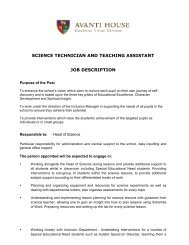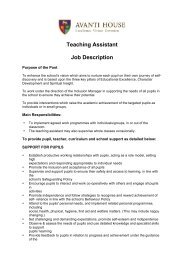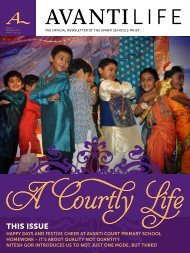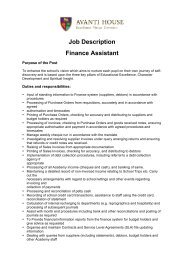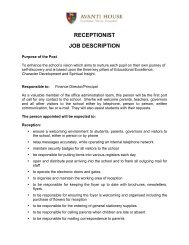Download - Avanti Schools Trust
Download - Avanti Schools Trust
Download - Avanti Schools Trust
You also want an ePaper? Increase the reach of your titles
YUMPU automatically turns print PDFs into web optimized ePapers that Google loves.
Issue 4June 2013avanti.org.ukAVANTI LIFEThe official newsletter of the avanti schools trusteveryjourneybeginswith asinglestepreflections from <strong>Avanti</strong> Court:the small steps and giant leapsof their first School yearALSO IN this issueHeadteachers – What should we expect from them?KRISHNA AVANTI'S GOT TALENTOfsted's first visit to Krishna <strong>Avanti</strong> LeicesterEnlightenment and the effort involved
Contents4 Krishna <strong>Avanti</strong>'s got talentKrishna <strong>Avanti</strong> Primary School celebrates the diverse talents of itspupils, in a spectular stage show, now a yearly calendar date.6 Headteachers – a dying breed?Gareth Jones reflects on the expectations placed uponHeadteachers; the roles they play and their future as a race.10 An inspector callsPanic and tension gives way to reflection and celebration, in thistale of an unexpected guest at a school in Leicester.12 Parents reflect on <strong>Avanti</strong> CourtIn Issue 3, Dr Susi Pinkus explains the importance of home-schoolrelations. In this issue, <strong>Avanti</strong> Court offers further proof.16 Learning journeys<strong>Avanti</strong> Court pupils have fun symbolising the year in a colourfuland creative way but what do they say about their time at school?18 The courage of KoorichhDravit Koorichh of <strong>Avanti</strong> Court reflects on his career journeyfrom managing the school to teaching at it.20 Gold medalist visits <strong>Avanti</strong> HouseGold medalist paralympian Tim Prendergast inspires <strong>Avanti</strong> Housepupils and teachers with his story of victory over adversity.21 Reflective readingJames Biddulph pursues the theme of reflection in his selectionof recommended reading for this issue.22 The HomecomingYear 7 pupil Jakub Skrzypulec draws us in to the story of adissaffected son, obliged to visit his dying mother.416202424 The temple with a tale to tellRichly illustrated murals now beautify the shrine of the <strong>Avanti</strong>school in Harrow. Here we offer an outline of the story they tell.28 The search for our centreScholar Dr. Graham M. Schweig talks us through the steps leadingtowards enlightenment, and the miracles that follow.28
In May, Krishna <strong>Avanti</strong> Primary School in Harrowheld its second annual talent contest; an event thatpositvely touched both audience and participants.Deputy Head Shriti Pandya provides more detail.Last year's contest took place during the day and on a much smaller scale. Sincethen, many pupils have asked for the competition to be held again. As a schoolit's important that we celebrate the many talents of our pupils as they don’talways have the opportunity to display them - especially to a large audience.There were over 60 acts that auditioned. Some of these were group acts, sothat's a huge response. After two rounds of auditions, we narrowed it down to 22acts who would perform on the day. The chosen acts had two weeks to practiceand three rehearsals were held in school.At the conclusion of the event, trophies were presented to 1st, 2nd and 3rdplaces, judged for their overall performance. All other acts who performed alsoreceived a trophy, kindly donated by FOKAS – the parent group of the school.Everyone who auditioned but didn't reach the final received a certificate, soeveryone's efforts were recognised and rewarded.The impact of the event has been huge. Reserved children were suddenlyfull of life since having the opportunity to shine. As for Tegh, the winner of theshow, the impact has been incredible. His class teacher is thrilled by the positiveeffect the contest has had on him. His peers see him differently, he tries harder inschool and his overall behaviour is extremely positive.4| JUNE 2013
Words from the winnerHi! I am Tegh, the lucky winner of 'Krishna <strong>Avanti</strong>’s Got Talent2013'. Furthermore, for my act I sang a song by Charlie Browncalled 'On my way'. In my words there were some great andworthy competitors such as Dia and her brother Rayan doing aKathak and drum fusion. Another spectacular act was by Arya andAryan Kumar dancing to Michael Jackson 'Smooth Criminal'.I felt royal and proud of myself. Also I was thrilled to be thewinner of such an important event. I would thank my wonderfulDad Billy for standing by my side, the judges for their support andHappy the caretaker. On that special day I felt I earned that respectand I proved that everybody has talent including myself.I felt amazed to be in such a great school that has providedthis terrific event for me and the other students of Krishna <strong>Avanti</strong>to experience. For the upcoming students of Krishna <strong>Avanti</strong>, weknow you have a hidden talent and if you come to this school youwill be able to prove that talent which we all know you have.Words from a runner-upHi, I’m Arya – runner up of Krishna <strong>Avanti</strong>’s Got Talent. As youknow, me and my brother Aryan danced to the phenomenalsong 'Smooth Criminal'. I would like to say a big thank you to mybrilliant Aunt who choreographed our act and my Grandma forputting so much effort into our performance.avanti schools trust | www.avanti.org 5
What kind ofHeadteacherdo you want?Written by Gareth JonesUK Heads are the best in the developed world, an international researchstudy concluded in March 2012. The Organisation for EconomicCooperation and Development (OECD), which produced the report,praised Heads in this country for "doing what school Principals shouldbe doing – spending time focused on learning, not administration".However, barely a month seems to go by without bannerheadlines in the educational press regarding a crisis inthe recruitment of Headteachers, predominantly in theprimary phase but also in the secondary sector.Various reasons are cited, usually accompaniedby statistical evidence from the government’s expert,Professor John Howson, formerly of Oxford BrookesUniversity, who publishes an annual report on the labourmarket for senior staff in schools. Many reasons forthese shortages are cited but most often:• Retirement amongst the baby boomer generation• The stresses of accountability – some say to over20 different groups; (teaching is the occupationwith the third highest amount of work-related stressaccording to Health and Safety Executive figures.)• Unreasonable parental demands• Constant tinkering with the education andqualifications systems by successive governments• The pressures of a negative OFSTED report whichcan result in job loss and has led to suicides amongstHeadteachers• The unwillingness of Deputy Headteachers andsenior leaders to take on the ultimate role, deterredby all the above.6| JUNE 2013
Michael Wilshaw, ex-Headteacher ofMossbourne Academy, who delightssome with his bullish utteranceswhile alienating many others?"I have no time for Headteacherswho go around moaning. They haveto get on and do it" and"If anyone says to you (as aHeadteacher) that staff morale is atan all-time low, you know you aredoing something right."Ask parents, pupils, staffand governors what kindof Headteacher they wantand you will get four very different,probably contradictory answers.Even the name 'Headteacher' seemsto be going out of fashion, replacedby 'Principal', with the semanticnuance that teaching is not the keyfunction.Various educational leadershipgurus, like John Westburnhamand Michael Fullan, have sought tocapture different styles of leadershipfrom the didactic, top down model– coercive, authoritative andpace-setting styles – to the morecollaborative – affiliative, democraticand coaching styles of leadership –with the emphasis on encouragingindividuals to develop professionallyand to sign up to a shared vision orset of goals which the team workstowards achieving. The suggestion"Would you really want Lord Sugarrunning your local school?!"is that a good Headteacher willemploy each of these stylesdepending on the situation she/heencounters.Others suggest that schoolsare now big business and thateducation should look to industryfor its template, encouraged byvolumes such as Stephen Covey'sSeven Habits of Highly EffectivePeople and Jim Collins' book Goodto Great. The concept here is thatschools should see themselves asa competitive business, analysingthe needs and aspirations of theircustomer-parents and aggressivelymarketing a bespoke educationalproduct to their target audience,refining their product as marketconditions change. The currentreputation of the financial sectorand the state of the Britisheconomy might suggestwe look elsewhere! Wouldyou really want Lord Sugarrunning your local school?!Currently, Headteachers haveto play many roles, amongst whichmight be deemed:• Accountant• Social worker• Media guru / Spindoctor• Charismatic Orator• Architect / Planner• Attendance OfficerHow would yourun a school ?Depending on the situationthat she/he encounters,a good Headteacher willemploy the leadership stylethat is appropriate. Here area few of the approaches torunning a school that aresuggested by educationalleadership gurus today.The Autocracycoercivedidactictop down8| JUNE 2013
• Data Analyst• Lawyer• Community Leader• Recruitment OfficerPerhaps the last of these comesclosest to what, in my view, isrequired in a modern Headteacher.It is totally unrealistic to expect asingle individual to have strengths inall the above areas and so the abilityto select a 'team of all the talents' isa key Headship quality, appointingindividuals whose strengthscomplement not replicate those ofthe Headteacher.What then of this baby boomer?After Headships in four schools,would it not be gracious to stepdown and let others take theirturn? The fact is that the shortagenoted above hits all schools, largeor small, successful or faltering,primary, secondary and special. And,of course, this is the best job in theworld, developing young peopleand seeing them grow and flourish,academically, spiritually and in termsof character so why would one giveup the chance to lead until oneis pushed? Indeed, I was recentlyasked by a parent of a Receptionyoungster whether I would still bearound to see his daughter graduatefrom <strong>Avanti</strong> House in 2026! We shallsee.So, any final words of advice fora would-be Headteacher? Five tipsthen on leadership:• The needs of the child areparamount• Only promise what you candeliver• Develop a team which covers allbases• Be reflective• Accept that on occasions, albeitrare occasions, you may bewrong!I leave the final word to one ofAmerica’s greatest leaders:"It is not the critic who counts,not the one who points out howthe strong man stumbled or howthe doer of deeds might have donethem better.The credit belongs to the onewho is in the arena; whose face ismarred with sweat and dust andblood; who strives valiantly; who errsand comes short again and again;who knows the great enthusiasms,the great devotions and spendshimself in a worthy cause and who,if he fails, at least fails while bearinggreatly so that his place shall neverbe with those cold and timid soulswho know neither victory nordefeat." Theodore RooseveltThe Democracyencouragedshared visionaffiliativeThe Businesscompetitioninnovationparents as customersavanti schools trust | www.avanti.org 9
AnInspectorCallsSally Hughes is Principal at Krishna <strong>Avanti</strong> Primary Schoolin Leicester. She talks us through the nailbiting momentswhich follow that most disquieting of calls.
This year in May Krishna <strong>Avanti</strong>Primary School in Leicesterreceived its first Ofstedinspection since it opened in 2011.The inspection lasted two days,conducted by one inspector.This was my 8th Ofstedinspection since they first startedin the late 1990s and my 5th as aHeadteacher. Each time the bar israised and expectations are higher.With each new Ofsted frameworkthe process becomes increasinglyrIgorous.We received the telephone callshortly after mid-day on Monday13th May, giving notice that itwould take place the followingmorning. I had just enough timeto have a meeting with the Chairof Governors, send the necessarypaperwork to Ofsted and hold ameeting with the staff.Ofsted wants to see how well theschool is doing and and if there areany weaknesses. They also want tofind out if the leaders and managersof the school know how well theschool is doing.Ofsted judges 4 areas: teachingand learning, behaviour and safetyof the pupils (very important aspectswithin this category are schoolattendance and spiritual and moraldevelopment of the pupils). It judgesattainment of pupils and leadershipand management of the school.Fortunately I had prepared avery concise but informative SelfEvaluation Form of the school,even though this is no longer arequirement by Ofsted.The inspector arrived at schoolby 8am on the first morning. Afterlooking at initial safeguardingdocumentation we had a longinitial discussion of 1½ hours aboutthe school. Then we carried outtwo lesson observations together.The inspector asked me what myjudgements were on the lessonsbefore he would assess them.Fortunately we agreed.Later in the day he watched megive verbal feedback to the twoteachers. Then he observed sixmore lessons himself. He met witha group of six children to ask themquestions about school. In theafternoon he held a meeting withthe Chair of Governors. He also metwith the Senior Leadership Team.Just before he left he gave me anInterim Judgement. He left school atsix o'clock on this first day.At 8am he came back forthe second and final day of theinspection. He spent this first part ofthe day interviewing parents in theplayground, as they were bringingtheir children to school. He attendeddaily worship and then carried outmore lesson observations and booktrawls. He held a meeting with thebusiness manager questioningwhether the school was good valuefor money.At mid-day he had a secondmeeting with the Chair of Governorsand myself. By 2.30pm he fed backhis final judgements to myself, theChair of Governors and the SeniorLeadership Team.I was reassured by the extremelyrigorous Ofsted process that myjudgements on the Self EvaluationForm had been very accurate. Theoutcome of the inspection thatKrishna <strong>Avanti</strong> Primary School issecurely ‘Good’ is a very pleasingplace for us to be, as the schoolis only in its second year. We arenow all driven to move the schoolto ‘Outstanding’. Ofsted has told usclearly how this can be done and weknow that we can do this!“We received the telephone call shortlyafter mid-day on Monday 13 th May,giving notice that the inspection wouldtake place the following morning”avanti schools trust | www.avanti.org 11
Parents reflectafter one year atParents reflectafter one year at<strong>Avanti</strong> Court Court<strong>Avanti</strong>
AnilaWe first heard about the school when planswere in progress for its proposed opening.The idea of a school that would follow such aunique, forward-thinking and inclusive ethosappealed to us as parents. We keenly listenedto Edward Anaboa and James Biddulph speakabout plans for the school and their vision ofhow the four pillars would guide their teaching.Of course all parents want to have thebest for their children, and given that thisschool was to be brand new, we made a visitto Krishna <strong>Avanti</strong> Primary School in Harrowin order to give us something to compare theschool to. This visit confirmed our feelings andwe decided that <strong>Avanti</strong> Court would be ourdaughter’s next school.Our daughter settled well into the school’snewly built building and well lit classrooms.She has made great friends and has formeda good relationship with her class teacherMiss Mistry and other teachers and staff at theschool. Raia will often skip into school andtalk animatedly about the interactive and funlearning opportunities she has been given. Shetells us “I love school... I love learning”. Raia willspeak about the activities she has participatedin at school such as Yoga, meditation and alsotalk about the values of the school (courageand respect etc.) and give examples todemonstrate her understanding of them.We have been delighted with our daughter’slearning experience at <strong>Avanti</strong> Court PrimarySchool and know that they will continue togrow and give children the same opportunitiesas they have given our daughter.Dimple PandyaOnce we attended an open day for <strong>Avanti</strong>Court, we knew that we wanted our son tobe a part of this new adventure and benefitfrom all it had to offer. We were overjoyed tolearn that our application for this school wassuccessful and that our son was going to bepart of something amazing!From the initial buzz of parents and childrenalike in the playground on the first day, to thewarm welcome from <strong>Avanti</strong> Court staff and thefantastic Headteacher, this first year has beenan exciting experience and an adventurousjourney for us and our son.The numerous school trips, the parentworkshops, the level of engaging with parentsby senior management, and a very happy son…these are some of the highlights of this pastyear for me as being part of the school.When having a fun interview scenario with myson and asking him what he likes best abouthis school, he answered "love my good friendsand I really like it when Mr Biddulph speaks tome when he sees me".The culture and ethos of the school areeffectively being embedded and I can see thisonly strengthening and shaping the future ofour children at <strong>Avanti</strong> Court.I consider myself to be very lucky andprivileged to have had the opportunity tosend my son to <strong>Avanti</strong> Court. We are now partof this amazing community and are at a bigadvantage as we have joined at the outset witha small school community. My hope is thatparents, school staff and senior managementcontinue to work together cohesively so thatwe can build a strong foundation for ourchildren’s future.I strongly believe that all pupils attendingthis school will stand out as unique individualswith supreme qualities once they completetheir journey of learning with <strong>Avanti</strong> Court.avanti schools trust | www.avanti.org 13
Ronika & ChetWe first learnt of <strong>Avanti</strong> Court in a pressrelease in the local newspaper. We had alreadysubmitted our application to the borough withour preferences for local schools. Naturallywe did some research as any parent would.We attended several open days and met withthe Headteacher. In addition we had severaldiscussions with Kala (Governor) whomwe found helpful and encouraging. This allcombined, enabled us to make an informeddecision. In excitement, even though slightlyapprehensive (as it was a new school), wejumped at the opportunity.The staff, led by the Headteacher at <strong>Avanti</strong>Court made our daughter’s transition fromnursery to school life seamless. All questionswere answered, all concerns were addressedand as parents, we felt at ease.In retrospect, we feel that we have madethe best decision for our daughter’s future. Ina short space of time, we’ve seen her matureand develop into an avid learner. We feelprivileged to be part of this exciting journeyahead.Shahida & MurtazaOur two boys love going to school (thoughwaking them up in the morning is a challenge!).They started their education in Chennai, inIndia, where we lived for two years. When wewere offered a place at <strong>Avanti</strong> Court PrimarySchool we were not sure. We did our researchand also we met with James who quicklyallayed our fears with his vision and focus forlearning and continuous improvement. Forus the <strong>Avanti</strong> ethos resonates with our Indiaexperience and so you could say it was 'kismet'that brought us there and back again.We have seen our boys grow (quite literally!)in the past year. They are making progressfrom reading, creative play or teamwork. Thisputs our mind at ease that their experience isrich and rewarding. We recognise this is a newschool and it will take time to bed in processes.But the school community is coming togetherto make things better for all our children andthat is great to see.
A Teacher ReflectSReflectSTeacher AAmy Sivadasan(Year 1 Teacher and Middle Leader)<strong>Avanti</strong> Court - One year on...The fate of <strong>Avanti</strong> Court well and truly drawn.Recipe for success shadowed by fear of the unknown...A perfect cocktail mix of apprehension, a pinch of perseverance,A sprinkle of hope, but a dash of confusion,A slice of excitement and a good spoonful of passion!But always hope and prosperity to unify our radiant dreams.The seeds of our labour have fully dispersed.Our fruits have flourished and <strong>Avanti</strong> now on the map.Testing times ahead promising more blood, sweat and fatigueAs the cries of inspection sets its dreary sights.Yet we seek solace in Krishna who guides us through the testingboundaries.Our vision is set and our hurdles are in sight.<strong>Trust</strong> inspection a success, Parent views scorching high,Borough moderation a triumphant breeze.Elated and contented parents an asset to the school,Delightful happy children praying for the day to never end!Time to relax and collect our thoughts,Meditating and seeking karma.Silent sighs of joyful children,Happy birthday <strong>Avanti</strong>.Looking forward to another year of fun, festivities and fulfilment!avanti schools trust | www.avanti.org 15
Pupils reflecton their learningJourneyJourneyChildren at <strong>Avanti</strong> Court havefun symbolising the year in acolourful and creative waybut what do they say abouttheir time at school?"I like to be with the teachers in theschool because they are kind"Diya – Shukla Class"I like school because it helps me learnhow to write I enjoy it so much"Devanshi – Blanco Class"School helps me learn my phonics"Aiden – Blanco Class"I love coming to school because I like playingwith my friends and I like taking away and maths"Kayan – Balta Class16| JUNE 2013
"When I come to <strong>Avanti</strong> Court it makes mehappy because I get to play with all my friendsand because it makes me stronger and everytime I learn I get courage!"Lewis – Shukla Class"I like learning about phonics and mynumbers and the little baby chicks"Nikita – Shukla Class"Mr Biddulph sings lovely songs with usand we have lots of fun in Shukla Class"Anya – Shukla Class"I want to play with my friends and my twin Lewisand I like to build castles and spaceships"Rudra – Shukla Class"I like writing at school"Aanya – Balta Classavanti schools trust | www.avanti.org 17
The courage ofKoorichhDravit Koorichh of <strong>Avanti</strong> Court reflects on his journey into teachingWhat is your role at <strong>Avanti</strong> Court?I am the school business manager. I joined to help start the school, and have loved every minute of it.There is more purpose in being a project manager where the assets are children’s learning and lives andnot just figures on a spreadsheet as in my previous jobs. And being around our <strong>Avanti</strong> Court childrenand having the opportunity to be involved in teaching and collective worship, the realisation that thisis what I wanted to do – to teach – became more apparent – and my need to act upon these feelingsmore necessary.Why did your journey change direction?Most of my career has been in project management and commissioning for public services but therewas a seed of doubt about whether this was right for me. I’ve always wanted to be in contact withpeople in the work I do but this didn’t really satisfy me. I started exploring careers which matched myskills, my personality and my need to work with people. I volunteered at secondary schools, prior to myrole at <strong>Avanti</strong> Court and was all set to become a secondary teacher in business and economics. But itstill didn’t feel quite right. But for some strange reason all the opportunities I had were taken away fromme: GTP at a local secondary, a <strong>Schools</strong> Direct place and a PGCE. Krishna was clear - this was not rightfor me.I started at <strong>Avanti</strong> Court as business manager, sitting with the Headteacher in our local café, workingout how to open up the school. I heard his passion for education at primary school and felt that thiscould be what I was looking for. He asked me some deep questions: “Do you want to teach subjects orthe building blocks of good learning and good values; do you want to teach the same subject every dayevery week every year; do you want to teach a wide variety of subjects?” More and more it sounded thatmy nature – a generalist, jack of all trades, passionate about our values – would be more aligned with aprimary setting. And so with this decision… interestingly, some doors began to open.Why <strong>Schools</strong> Direct?<strong>Schools</strong> Direct is a new scheme to train people to become teachers or those who want to changetheir career. The Wroxham Alliance & Teaching School is also inspirational – with a Headteacher who iswell known nationally and when James suggested I explore this, the seeds of inspiration were sowed.I applied to the Alliance & Nottingham University and after a rigorous interview process I was given aplace. So now, looking back on what I have contributed to <strong>Avanti</strong> Court as a business manager – settingup systems, learning to manage the complexity of school life, promoting the school – making it allhappen, I now look to the future, to learn how to engage and inspire children to be the best they can be.I am excited about the opportunity. This is what <strong>Avanti</strong> is all about – everyone is on their ownjourney of self-discovery. My new chapter is about to begin, with a Year 2 class, and I cant wait!18| JUNE 2013
We are reviewingthe situation…The doors to <strong>Avanti</strong> Court opened in September 2012, and since thattime the school has lived up to its promise that everyone is welcome andeveryone is included – a promise they even make to school inspectors!Headteacher James Biddulph reflects on the past year and welcomes theyear ahead.As Gareth Jones expressed in his article 'Whatkind of Headteacher do you want?' (see page 16–19),school leadership is now a very complex businessrequiring a diverse set of skills and reservoirs of hopeand energy! Charles Dickens’ commentary on societyand education is well known and looking back at the lifeof <strong>Avanti</strong> Court in its first year, I remember one passagefrom Oliver Twist:“The sun—the bright sun, that brings back, not lightalone, but new life, and hope, and freshness to man—burst upon the crowded city in clear and radiant glory.Through costly-coloured glass and paper-mendedwindow, through cathedral dome and rotten crevice, itshed its equal ray.”This year has been filled with ‘new life’ and ‘bursts’ ofsunshine as we move towards our own ‘glory’.Exceeding ExpectationsThe glimmers of light and positive outcomes for our<strong>Avanti</strong> Court children are reflected in the two inspectionvisits conducted by the <strong>Trust</strong> and the Redbridge LocalAuthority. As Headteacher I am particularly pleased thatJohn Myer and Maureen Hart (advisers at Redbridge)noticed very good improvements in the school:"The excellent way in which visitors to the school arewelcomed… the school’s ethos is evident’‘"Standards are high with a significant number of pupilsachieving above the expectation for their age""Reading and writing is very good and aboveexpectations""Teachers know their children exceptionally well"Happy LearnersLikewise the <strong>Trust</strong> commissioned a no-notice inspectionto evaluate how far the school had developed in itsshort 6 month history. Their findings show that we havecreated a school community and not just a place wherechildren come to school:"Parents are very supportive of the ethos that underpinsthe work of the school and of the vision moving forward""Pupils listen attentively… they are making very goodprogress in improving their focus when workingindependently""Very effective assessment tracking procedures enableschool leaders to initiate pupil progress meetings"Finally, and most importantly for me: "Children lovecoming to school and their behaviours show that theyare very happy." Happy learners make good ones!!So as Fagin said in the hit musical, “we have beenreviewing the situation” and the situation is lookingpromising for the young people at <strong>Avanti</strong> Court, but alsofor their families and our community.avanti schools trust | www.avanti.org 19
Tim Prendergastinspires pupilsand teachersReport by Luke Hindes (PE – <strong>Avanti</strong> House School)On the 13th of May <strong>Avanti</strong> Househad an inspirational visit fromParalympic athlete Tim Prendergast.Tim represented New Zealand at theAthens Paralympic games, winninga gold medal in the T13 800 metrescontest.Tim led the <strong>Avanti</strong> Housestudents through the challenges hefaced as an eight year old losing 95%of his vision. His story captured theemotions of the Year 7 students andteachers with the overall messagebeing if you change from a negativeto positive mindset and facechallenges head on you can achieveany goal (or Gold!).After the assembly Tim ranworkshops with students oncommunication and team buildinggames. Tim is an athlete mentorfor the Sky Sports Living for Sportsprogram which <strong>Avanti</strong> Housestudents will be running over thesummer term.20| JUNE 2013
ReflectiveReReadingectiveRedingReflective Teachers are those teachers who standback and consider what they do, how they do it,why they do it, and ultimately, the impact it ishaving on children.Research in schools is about developing teachers to become increasingly reflective and support colleagues indeveloping a rich dialogue to support the development of all. These books provide a good guide to engage staffbodies in reflective practice – and coupled with the meditation and mindful books suggested in previous editions of<strong>Avanti</strong> Life, serve to improve education of everyone in schools – not only the children!The Teacher's Reflective Practice Handbook:Becoming an Extended Professional through Capturing Evidence-InformedPracticeBy Paula Zwozdiak-Myers2012, RoutledgeWhat do we mean by reflective practice? How can it help you develop as a teacher?Helping you to translate pedagogical knowledge into practice, this Handbook guides youthrough studying your own teaching for personal development, evaluating your lessonsthrough classroom research, and enhancing the quality of pupil learning.Reflective Teaching 3rd Edition:Evidence-informed Professional PracticeBy Andrew Pollard2008, ContinuumAndrew Pollard is a leading voice on reflective teaching practice. This book, now in its 3rdedition, is a staple for any educators’ diet to support their own professional development.Ahead of the Class:How an Inspiring Headmistress Gave Children Back Their FutureBy Lady Marie Stubbs2003, John MurrayA book by Lady Stubbs, Headteacher of St Georges School in London. The school, nowsuccessful, was one of the worst in the country with shockingly low attendance, poorattitudes to learning and a school with no heart or purpose. This honest book is anexample of one Headteacher reflecting on her journey - a good summer read to inspireus all to continue in adversity!avanti schools trust | www.avanti.org 21
The HomecomingA story opening by Jakub Skrzypulec
Earlier this year, pupils of <strong>Avanti</strong> House School began a unit ofcreative writing. Lessons focussed on descriptive writing, making use offigurative language, with importance placed on becoming a consciouswriter – thinking carefully about each word that graces ones page.Students learnt how to use language devices such as similes,metaphors, personification and adjectives. They were also taught how touse a range of sentence structures and punctuation for increased effect.For one particular task they were asked to create a story openingusing the above named devices. Jakub did incredibly well, in resultreceiving a Level 6 (outstanding for Year 7) for his piece of work 'TheHomecoming'. He already has people asking him for the next part of thestory...David stepped out of the gleaming black limousine; hischauffeur pulled down the window and asked “How longwill you take, sir?”“Only ten minutes.” David replied in a deep posh voice, while puttingup his umbrella. “Ok sir.” said David’s chauffeur with relief on his tiredface.The rain was pouring down and the wind was moaning. Davidlooked at the familiar path and door. He remembered all the things thathappened to him here, like falling over and smashing his head on thecurb or the time when he found a one hundred pound note in the gutter.That time he knew he was going to become rich… and he did!David sighed and slowly walked up to the small, purple, ancientlooking front door. The door had a big crack running down the centre,which was where he kicked it open ten years ago. Since then he hadn’tset foot anywhere near that door. Up until now.He was going to see his mother again. David had very little andmaybe even no feelings towards this matter. He had conducted a veryDavid sighed and slowly walked up to thesmall, purple, ancient looking front door.dull but successful company for the last eight years. He had learned notto feel compassion, pity or any feeling really to anyone except those whoare dead. His lawyer had convinced him to come back to his motherto talk about his heritage as she had cancer and was going to die verysoon.David raised his hand slowly and knocked twice. No one answered.He was just about to knock again when the door swung open. Out ofit peeped a small, grey haired woman. “Can I help you?” The womanasked. “Hello Mother.” David whispered, licking his lips.Upon hearing that, the woman’s eyes widened with shock and panic…avanti schools trust | www.avanti.org 23
ABOVEBEYONDThe templewith a tale to tellIf you've ever visited the Krishna <strong>Avanti</strong> Primary School in Harrow,you would have marvelled at the white marble temple that gracesthe inner courtyard. Within the shrine, upon an intricately carvedaltar, you'll find gorgeously decorated deities of Krishna and Hiseternal brother Balarama. If that weren't enough of a visual treat,cast your eyes upwards, where the story continues.<strong>Avanti</strong> schools share a special ethos, rooted in theteachings of Chaitanya. Over the centuries, theseteachings have often been relayed by means ofstorytelling; the most popular of which tell us ofKrishna's charmed childhood in Vrndavana, India.Despite its impressive architecture and sereneatmosphere, a visit to the school's temple may stillleave one confused as to who Krishna is and whyis he worshipped? The recently installed artworks,commissioned by Nitesh Gor and created by local artistEmma V. Moore offer a colourful insight into the lifeand times of Krishna, and why his devotees find him sodelightful.On the following page you'll see the four murals,depicting a total of twelve much-loved scenes fromKrishna's pastimes plus a concise outline of the storywritten by the artist. Find more of Emma's artwork here:behance.net/emmavmooreavanti schools trust | www.avanti.org 25
ABOVEBEYONDA long time ago, in a faraway land...Whirled Away!Wicked King Kamsa sent manydemons to destroy Krishna, whohe knew to be no ordinary boy.One of these appeared as a greatwhirlwind, lifting the baby boy intothe air and carrying him far awayfrom Vrindavan. Krishna held ontothe neck of the whirlwind demonwho fell like a stone to the groundand died.The Company of Dear FriendsUnder the shade of a beautifulbanyan tree, Krishna sits with hisbrother Balarama and their friends,eating the delicious food preparedby their loving parents. The cowsare happy in their pasture, andthere's just enough time to enjoythe exchange of stories and jokes,especially those of the funnybrahmin boy, Madhumangala.Defeating KaliyaThe river Yamuna once turned blackwith poison because of the terrible,many-headed snake named Kaliya.Krishna danced on the heads of thesnake, who quickly began to die.Fearing for the life of their husband,the wives of Kaliya prayed to Krishnato spare his life. Kaliya was banishedfar away from the land of Vrindavan,and the river became crystal clearonce again.Krishna Is No Ordinary BoyLike all small children, little Krishnaloves to put things in His mouth!One day, his mother caught himeating mud. As she looked into themouth of her son, Mother Yashodasaw the whole universe. Realisingthat her son was the Supreme Lord,she fainted with surprise, but Krishnamade her forget this and she awoke,remembering nothing.Two Naughty BrothersKrishna and His brother Balaramacan't resist the delicious butterthe gopis make and hang in potsfrom the ceiling. Because Krishnais only a small boy, he breaks thepots by throwing stones. Believingthemselves unseen, He andBalarama eat the butter and feed itto the monkeys and crows.Krishna Frees Two Heavenly BeingsWhen mother Yashoda catchesKrishna stealing butter, she ties himto the wooden grinding mortar.Krishna cries a little, but then crawlsout of the house, dragging themortar along with Him. The grindingmortar gets stuck between two treesand as Krishna pulls, the trees falldown and two heavenly brothers,cursed long ago to become trees,are now freed.26| JUNE 2013
The temple with a tale to tellTranscendental DancersIn the secret, moonlit groves ofVrindavan, Krishna and the gopis(cowherd girls) perform the 'rasa'dance. Krishna moves swiftlybetween each gopi, who believesthat she alone is Krishna's dancepartner. The night is filled with thesound of ankle bells and the expertmusical talent of the beautiful gopis.Radha and KrishnaRadha is the most beloved gopi ofKrishna. She is the most beautifulamong the cowherd girls and knowswell how to enchant Krishna withher expert singing and playing ofmusical instruments.A Circle of Beloved FriendsKrishna loves to meet with hisbeloved Radha and her gopi friends.The gopis seen here are knownas the 'astasakhis' (eight friends)and they are the most confidentialassociates of Radha and Krishna,assisting in the meeting andpastimes of the divine couple.Coming HomeKrishna is a cowherd boy in thebeautiful land of Vrindavan. Alongwith his friends the gopas (cowherdboys), Krishna takes the cows out topasture every day and brings themback as the sun sets. At this time,Krishna's mother and father and hisbrother Balarama greet him withhearts full of joy.A Terrible Fire!In His wanderings through theforests of Vrindavan, Krishna oncesaw that a demon had createda terrible fire which was rapidlydestroying everything in its path. Ina majestic display of power, Krishnaopened his mouth and breathed thefire into His own body, saving thelives of the forest's many animalsand birds.Throwing ColoursDuring the festival of Holi, Krishnaand His friends like to throwcoloured powders at the gopis.Never to be defeated in anytranscendental game, the gopisthrow colours back and the villagerslook on with amazement at theirbeauty and playfulness.avanti schools trust | www.avanti.org 27
The searchfor our centre28| JUNE 2013
ABOVEBEYONDDr. Graham M. Schweig takes us on a journey to the centre of theheart, taking guidance along the way from Bhagavad Gita and theYoga Sutras of Patanjali. For those on the path, he offers a reassuringrevelation: as we move nearer towards our destination, ourdestination is also moving towards us.The two major classical texts on Yoga,namely the Yoga Sutras and the BhagavadGita, indicate that the attainment ofenlightenment requires great effort anddiscipline.The practitioner’s exertion or effort or “intensediscipline” (tapas) is a theme in the Sutras, and effortor striving (yatna) as necessary on the part of thepractitioner for achievement of higher states ofconsciousness is a theme in the Gita. Most of theguidance in these two great works centers upon whatwe as practitioners should do, can practice, must avoidor engage, might perform, and so on. No doubt, there ismuch instruction on what we must do to strive for andachieve enlightenment in Yoga.However, there is another side to enlightenment. It is aless known side, a more subtle or hidden side, a side thatoften goes unnoticed or that simply gets overlookeddespite its dramatic expressions in the sacred texts onYoga. It is the side of englightenment that is a gift, theside that is an offering from something much greaterthan ourselves. It is the side of divine grace.In the Yoga workshops I offer, I often ask my studentswhen introducing themselves to the group, “I know allof you have been doing Yoga. But how has Yoga beeninfluencing you? How did Yoga enter your life? Howdid Yoga make itself known to you?” My query stronglysuggests that Yoga is not just something that we do, butYoga has a special power that does something to us. Wehave all experienced it in our own ways.When we practice Yoga, a certain light of knowledge anddevotion becomes ignited in us. In a general sense, thisis englightenment. But the other side of enlightenmentis the way in which the power of Yoga itself, a powerindependent of us, allows us to excel in greater levels ofconsciousness that formerly we could not even imagine.It is that power which, paradoxically, lifts us up intohigher realms of achievement most effortlessly. The Gitatells us that this is the gift of the divine, Yogamaya, “thedivine power of Yoga.”Enlightenment is not something that suddenly turns onone day. Rather it is something that we grow into moreand more. Patanjali shows us that enlightenment is adeveloping thing in his exposition of the stages leadingto samadhi and even within samadhi itself. Althoughsamadhi is considered the perfectionYoga, it too has many stageswithin its sabija phases, on theway to nirbija and dharmamegha-samadhi.Fromthe very beginning of ourpractice, englightenmentbegins as the tiniest sparkand moves into its blazingfires that contain both itsdivine gifts and extraordinaryachievements.Patanjali cleverly presents an idea of divine grace inone of his longer sutra texts. If one knows to look for it,one finds in his vision of divine grace a most profoundpresentation and, perhaps surprisingly, a metaphoricaldescription of it as well. The idea of divine grace or acertain power of Yoga that favours and enhances ourpractice can be seen in the experience of samapatti,which, amazingly, is presented only once in the Sutras inthe following:When the turning has ceased, whenthat which is inborn shines forth like thatof a jewel in the one who grasps [the meditator],in the grasping [the act of meditating] and in thatwhich is to be grasped [the object of meditation],one stands so near that one attains a statein which a magic ointment has been absorbed–this is samapatti.Yoga Sutras 1.41What is being said in this sutra text? First, the turningsof consciousness that have been conditioned by themind’s impressions cease. Then that beloved divinity,ishvara, embedded within the consciousness of self,avanti schools trust | www.avanti.org 29
ABOVEBEYONDApplicationThe nitty gritty: confronting theconditioned mind and its deeplyingrained habits. Break these patternsand real meditation can begin.Meditation1 2 3Through sustained concentrationand devotion, you have succesfullyplaced the object of your meditationat the centre of your conscious self.ReciprocationYour efforts are rewarded. Now inthe deepest of all meditative states,the once elusive object of meditationfinally manifests, shining upon you.shines forth like that of a jewel due to its pure turningswhich are conducted within meditation, just as oneturns a fine jewel to catch the light in its perfectly cutmultiple facets. Theturnings of conditionedconsciousness ceasewhile the turnings of pureconsciousness occur inmeditation. When themeditator, the meditating,and the meditated reach perfect harmony with oneanother, the meditator enters a meditative state in whichhe or she absorbs a magic or divine “ointment” thatcomes from the meditated. This ointment is a metaphorfor divine grace. Thus samapatti entails a grace thatreciprocates the efforts, strivings, and achievements ofthe meditator in reaching the divine object and in givingone’s self fully to the divine.This text defining samapatti utilizes two metaphors fordescribing its experience. The consciousness of themeditator is compared to a jewel that is so pure, sopolished that it can shine forth due to its capacity tocatch the light that shines down upon it. The impliedelement of light in the aphorism’s first metaphor of theshining jewel is reinforced by the explicit and tangiblesubstance of an ointment that is put forth in the secondmetaphor of the sutra text: that state of consciousnessin the meditator that absorbs the ointment from theobject on which he or she is meditating. This light, thisointment, which comessamapatti: a grace that reciprocates theefforts, strivings, and achievements of themeditator in reaching the divine object.from a divine object insamapatti, powerfullyexpresses to the readerof the Sutra what theessential mechanics ofdivine grace in Yoga are.It is known that Patanjali was himself an Ayurvedicphysician and thus it is no surprise that he would drawimagery from that field to describe the ultimate state ofYoga. The application of this “ointment” (anjana) certainlydraws imagery from Ayurvedic massage, in which thedoctor applies the medicinal ointment to the body withthe circular “turning” movements of the hands, withsuch massage strokes always moving in the directionof the patient’s heart. In Yoga, when the turnings ofconsciousness are likewise turning in the direction ofthe spiritual heart, these are the unconditioned, pureturnings of consciousness that one discovers in thedeepest meditative state of Yoga as samapatti.It is important to note that Patanjali uses the word grahitr(“the one who grasps”) for the meditator, the word30| JUNE 2013
The search for our centregrahana (“the grasping”) for meditating, and the wordgrahya (“that which is to be grasped”) for the objectupon which one meditates. These three componentsthat are united in samapatti as subject, verb, and objectof meditation, respectively, are all derivative from theSanskrit verb root grah, which most literally means “tograsp.” Naturally this verbal root is the same root fromwhich one of the most commonly used words for“grace,” namely anugraha, or that which “follows (anu-)the grasping (-graha)” of the divine, is derived.From this discussion, it is hoped that this special powerof Yoga may be more appreciated. It is a power that wecannot control, it is a power that cannot be predicted.It is a gift, it is a grace, it is a cause of gratitude andreverential awe in a practitioner for whom this power hasbeen efficacious and so moving. Thus it is in Yoga thatwe are to be united with something much larger, muchgreater than ourselves, something that contains thewhole universe.And when we become fully self-realized, fully self-aware,fully enlightened, as it were, we will traverse to theother side of enlightenment where we can now affordto lose ourselves completely in the selfless service ofothers’ hearts fully. It will occur when we are dwellingin this state permanently, when we will experiencespecial graces of the divinity within us, around us, andeverywhere. There is no limit to the ways in which thedivine can so sweetly and lovingly embrace us.As we are to “grasp” the divine in meditation, so now, inresponse, divinity “grasps” us in the form of divine grace.This is anugraha. We can observe anugraha or thatgrace which follows in response or in reciprocation tothe yogi’s strivings and efforts in the Bhagavad Gita. Thefollowing two verses illustrate the grasping of the yogi,as it were, and Krishna’s response of divine grace:However, for those who, having fully renouncedall actions in me, are devoted to meThrough this yoga and by no other means;who, meditating on me, offer worship;For them, I soon become the one whocompletely lifts them up from the oceanof the cycle of death,O Partha, for their thoughthas been drawn to enter into me.Bhagavad Gita 12.6–7Here it is so eloquently stated by Krishna that for onewho is a yogi, who is fully absorbed in and devotedto pure action and meditation, and with a pure heart,divinity quickly becomes the deliverer of such a soulfrom samsara, the endless “cycle of death.” Indeed, theconsciousness of such a yogi “has been drawn to enter”into the divine.Dr. Graham M. Schweig earned hisdoctorate in comparative religion fromHarvard University. He was a formerResident Fellow of the Center for the Studyof World Religions at Harvard. Grahamwas a Visiting Fellow at the Oxford Centrefor Hindu Studies of Oxford University,has been invited to be a Visiting Fellow ofClare Hall at Cambridge University, andwas formerly Visiting Associate Professorof Sanskrit at the University of Virginia.Graham's teaching began as a Teaching Fellow at Harvard, andLecturer at the University of North Carolina as well as DukeUniversity. He is regularly consulted by dissertation committeesas a reader or advisor for doctoral candidates around the world.He is presently Professor of Philosophy and Religious Studies andDirector of the Asian Studies Program at Christopher NewportUniversity in Virginia.Graham has contributed numerous pieces to encyclopediavolumes, journals, and books. Among his books are DANCE OFDIVINE LOVE, which was published by Princeton University Press(2005), and BHAGAVAD GITA: The Beloved Lord's Secret Love Song,which was published by Harper Collins Publishers (April 2007).avanti schools trust | www.avanti.org 31
Put your thumbs up for<strong>Avanti</strong> <strong>Schools</strong> <strong>Trust</strong>!about an hour ago · Like ·1 personFacebook is, like it or not, a way of life for manypeople today (1 billion people to be preciseish).Whether treated as a just another way tocommunicate or as a powerful web-based opiateto suppress loneliness and boredom, nobody would denythat for its users, Facebook has become integral to theway they function.For the vast majority, it’s a source of news, which iswhy <strong>Avanti</strong> <strong>Schools</strong> <strong>Trust</strong> has created its own Facebookpage. Facebook is designed to make sharing news easy,but this is where our challenge lies. The spread of ourlatest news depends not on word of mouth, but wordof mouse. Unless interested people click ‘like’ for <strong>Avanti</strong><strong>Schools</strong> <strong>Trust</strong>, they’ll never get to hear from us.Visit our Facebook page HERE andsuggest your friends do the same



